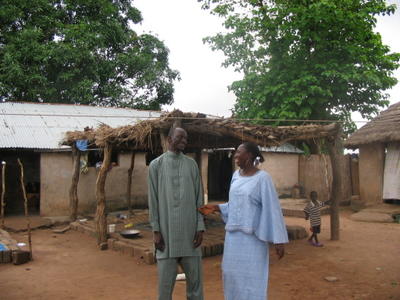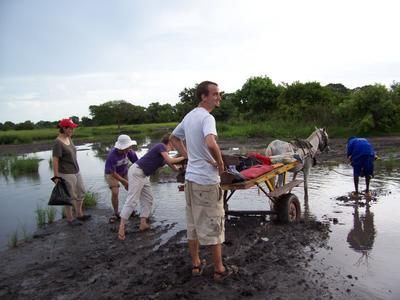In a Land Far Far AwayI left for The Gambia in July, 2005 with Peace Corps, this blog is meant to record my experiences. |
Related Blogs / SitesThe Gambia - Links
Previous Posts
Archives |
Tuesday, October 04, 2005Typical DaySo, since moving to Kombo, the most heavily populated part of The Gambia, my daily routine has shifted significantly. It is amazing the difference between the two places, so I figured I’d illustrate this by putting up a normal day of activities for me in each location. While I was in Sare Samba, 7k off the “main” road [see main road picture], which is one of the worst stretches of road in The Gambia, I was in training to become a Peace Corps Volunteer (PCV). Now in Kombo I am at my permanent site with the Department of State for Education (DoSE) and am a PCV instead of a PC Trainee (PCT). As I write this, I am sitting in my new home, a fan blowing on me and what has proven to be a fairly constant supply of power running my computer. Between my computer and the wall is a voltage regulator, a piece of equipment that ensures that my machine doesn’t receive dirty power. I am drinking a cup of nescafé – real coffee is almost nonexistent here, and would be appreciated if somebody feels like sending some. I brewed the nescafé by boiling water in my wok (already rusting) over my butane stove (propane being too expensive right now due to fuel shortages). I ate a lunch of green beans, cold lentils, and pita bread while watching an episode of Batman Beyond on my computer. As you will see, my life in Kombo is significantly different from that in the stix. Still, there are some pretty big differences in both places with life in America. One of the largest differences is that while one day blends into the next in terms of routine, you never know when the water might stop, the power might go out for a week, or the grocery store might stop stocking an essential. Here at the far end of the global chain of consumption buying power isn’t large enough to ensure a constant supply of rice, let alone snickers. At any rate, here is a normal day for me in Sare Samba: 6am - Hear Activity: Around this time of the morning something or other would get my attention and slightly wake me up. Maybe it’d be a goat rubbing against my door, a rooster crowing, or a donkey braying. Sometimes it would even be one of my mothers or sisters beginning to pound the kous, though they usually didn’t start as early as 6am. Kous, or chere in wolof, is millet pounded [see women pounding picture] and slightly fermented. It is an acquired taste, but with a sorrel or moringa (local plant) sauce I thought it was fairly good. 7am - Wake Up: After having fallen back asleep since the first signs of activity, I generally woke up between 7 and 7:30am. Waking up involved climbing out from under my mosquito netting – a very effective defense against falling debris from the thatch ceiling, let alone mosquitoes. I would proceed to rinse and hang up the laundry that I had left soaking in my left over bucket bath water from the night before. I found letting some of the shampoo soap get into the process made my clothes smell better than just the 5 D (dalasi – ~27 D = US$1) laundry soap. After hanging my clothes on the line strung over the wanuck (fenced in area behind the house, including pit latrine) I would brush my teeth, spitting the water on the ground and sloshing clean water in my mouth through my toothbrush to rinse it out [see wanuck picture]. Then I’d get dressed and such while listening to the BBC World News on my shortwave radio – a device I was very thankful for - thanks Janet! Dressing always involved taking clothes down from the internal clothes line I had strung. You don’t want to leave clothes on the ground because it is too easy for things like scorpions to crawl in and make your morning much less pleasant. After a month plus I wasn’t really overly concerned about the scorpions, centipedes, millipedes, toads, and snakes, etc. But at first I was especially concerned about the scorpions and snakes. After finding out that a scorpion bite only implies about 48 hours of pain and 24 hours of a numb limb though I was less concerned about them than I had been when I thought it might mean a medevac. Still, hanging the clothes was a good idea, since I encountered 4 scorpions in a month and a half, and one of those was inside and small enough it could have easily escaped notice. I only saw 1 snake, but others saw more, Colleen who I’ve been seeing even saw a poisonous one, most likely an adder. The scorpions in Sare Samba were black and grew to be larger than your hand. According to local beliefs you aren’t supposed to kill a scorpion because then more will come. Instead when an adult scorpion is encountered it is pinned to the ground and the stinger is removed. It is then tied on a string and hung at the entrance of the compound as a warning to other scorpions. The scorpion eventually dies, but it can take up to a month, depending on the severity of its wounds. Once I done with this routine I would open my corrugated iron/wood frame door, thereby signaling to my family that I was awake and dressed. They were normally going about their morning chores and such, so generally I then just read or listened to the news while waiting for it to be time to go to my morning language class. 8am - Language Class: As I prepared to leave the compound for class I locked my hut up with a padlock. Inside my hut I had a metal chest that was also locked that contained my valuables. This was not a precaution against my host family, who would never have taken something maliciously (though my little brothers certainly would have for fun). But as was illustrated to me the morning of the day I left Sare Samba, robbery exists even in little villages of 200 people. My host father’s bidik (small shop) was broken into and a significant amount of his merchandise and money was taken. It was the first time this had ever happened to him, but the concept was not unheard of in the town. Likely it was somebody passing by, for unknown reasons, since a person in the town couldn’t hide such a theft. The thief burrowed under the back wall of his hut during the night in order to take the goods, and did it quietly enough so that my father didn’t hear him from where he slept in the other room. But on the whole theft is not a large problem in the remote communities, and is a much larger problem in the urban areas. After locking up my house I would ask if my breakfast was ready to take. Some morning it would be ready, other mornings one of my mothers, sisters, or brothers would deliver it to me at class on their way to the fields. Occasionally everyone would eat before I left, in which case I would sometimes eat breakfast with them from the food bowl. This was rare though because they normally had something with milk in it. Since the milk was not pasteurized I couldn’t drink it for fear of brucellosis. When I explained this to my father, and that I needed to boil the milk in order to eat it, he explained that I could not do this. According to his beliefs, which aren’t shared by everyone in The Gambia, boiling milk will cause the cow that gave it to stop giving milk. As such I didn’t drink milk, but sometimes would have curdled milk (close to yogurt), which lowers the risk of exposure to brucellosis enough as to meet Peace Corps standards of acceptable risk. After getting my breakfast I would walk over the town green, greeting those I met on the way, to my Language and Cultural Helper’s (LCH) compound. We had two LCHs during training, Xadi So (X pronounced like the guttural “ch” in chala bread), and Modu Ngum (pronounced nn-goom) [See picture Xadi and Modu]. Modu started class at 8:30am and Xadi at 8am. Once the three of us, Fatu (Sara), Adam (Nancy), and myself (Mike or al-Haji) were assembled for class it would begin. Morning class concentrated on some language topic, and was generally centered on the blackboard. More coming as I've got time and internet access... |
|





